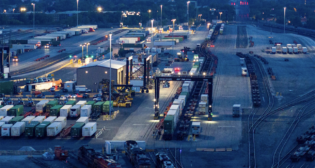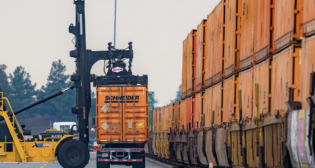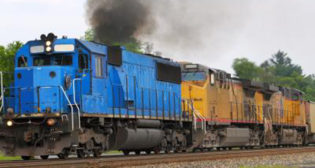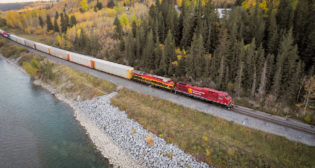
KCS Sees 2Q Revenue Drop Due to COVID-19—But Still Tops Expectations
Written by Andrew CorselliKansas City Southern (KCS) reported 2Q20 revenues of $547.9 million, a decrease of 23% from 2Q19, primarily as a result of an overall decline in demand due to COVID-19. Overall, carload volumes were down 21% compared to the prior year.
KCS’s 2Q20 operating expenses were $367.5 million, including $10.5 million of restructuring charges primarily related to the voluntary separation program implemented in the quarter. Operating income was $180.4 million, and the reported operating ratio was 67.1%. On an adjusted basis, the OR was 65.2%. 2Q2020 net income was $110.3 million, or $1.16 per diluted share. Adjusted second quarter operating income, operating ratio, net income and diluted earnings per share were as follows:
Due to the “general economic uncertainty created by COVID-19,” KCS is not providing guidance on revenue, volume, operating ratio or earnings per share. Previously provided 2020 capital expenditure guidance remains $425 million or below. Guidance for 2021 and 2022 capital expenditures remains at ~17% of revenue. KCS said it “is on track to deliver $500 million or more of free cash flow in 2020.”
GAAP Reconciliations
“Kansas City Southern demonstrated excellent execution during an extremely challenging quarter,” stated President and CEO Patrick J. Ottensmeyer. “Our network experienced a rapid decline in volumes followed by an unprecedented rebound, forcing us to quickly adjust our service model to match customer demand while optimizing our cost structure.
“I would like to thank the men and women of Kansas City Southern who work tirelessly under challenging circumstances to deliver essential freight transportation and keep the U.S. and Mexican economies running. Their efforts have allowed KCS to continue providing consistent and reliable service to our customers.
“Precision Scheduled Railroading is producing sustainable improvements to customer service and operations, and has been a key contributor to the Company’s strong cost performance this quarter. Although visibility into second half volumes and revenue remains limited, the Company is focused on retaining the efficiencies gained during the second quarter, and reiterates its outlook to deliver at least $500 million free cash flow in 2020. We are confident in our operational execution, and believe KCS will emerge from these challenging times even better positioned to deliver superior growth and shareholder returns.”
THE COWEN INSIGHT
“KSU’s 2Q2020 EPS beat was due to PSR-driven cost savings, with the top line a little soft, though this was likely expected,” noted Cowen and Company analysts Jason Seidl (Managing Director and Railway Age Wall Street Contributing Editor), Matt Elkott and Adam Kramer. “We continue to believe that much of the cost reduction can be maintained, even when carloads recover, as we expect they will. We raise our price target to $172 and continue recommending KSU as our top rail pick.
“The preliminary trade agreement with Mexico provides a positive longer-term outlook for KSU’s critical auto, intermodal and energy businesses. The prospect of new oil drilling south of the border could prove to be a strong long-term growth driver to complement continued improvements in cross-border intermodal volume. We expect some operating leverage in 2H20 and service in Mexico to continue improving, with some benefit network-wide from PSR implementation.
“The USMCA trade agreement adds new areas of business for KSU, while KSU’s intermodal franchise takes market share.
“KSU reported adjusted EPS of $1.15, above our and consensus’ $1.10 expectation. Revenue of $547.9MM was about 23% lower y/y and was slightly below our $552.9MM and consensus’ $556.7MM estimates. KSU’s adjusted operating income of $190.9MM was above our $185.5MM but slightly below consensus’ $192.1MM estimates. Adjusted operating ratio (OR) of 65.2% was ~140bps worse y/y, ~130bps better than our estimate, and ~30bps better than the Street’s expectation.
“Relative to consensus, revenues in Chemical and Petroleum, Industrial and Consumer, Agriculture and Minerals and Intermodal missed, while Energy and Automotive registered slight beats. Finally, Other Revenue beat by $5MM. With the ongoing uncertainty in the macro environment, we were not surprised to see KSU continue not to provide financial guidance or outlooks for specific carload/commodity types.
“As KSU highlighted in our recent investor meetings with the Class I, much of the progress made with expense reductions in recent months during COVID-19 will not be reversed as traffic returns to the network. With carloads in mid-July only down ~6% from where they were in January, daily crew starts are still 29% lower than they were in January, a striking illustration of the progress made through PSR and what margins could look like in 2H2020 and beyond.
“Opportunities remain for further cost improvements, too. KSU has extended average train length from 5,800 feet to 7,200 feet, a significant change that will save fuel and crew costs. However, even 7,200 feet is still below the current average train length at other Class I’s that are also extending their train length. Even as KSU adds double track and extends sidings to catch up to peers, it is chasing its competitors’ moving targets, providing even further room for improvement—and cost savings—for KSU.
“We adjust our 2020 and 2021 EPS estimates to $6.65 and $8.20 from $6.45 and $8.00,respectively, the result of the slight 2Q2020 EPS beat, margin commentary, and other model fine-tunings. We increase our multiple to 21x (essentially KSU’s longer term average multiple) from 19.5x to account for KSU’s strong PSR execution and longer-term growth opportunities. Using this 21x multiple and our new 2021 EPS estimate, our price target goes to $172 from $156. KSU continues to be our top rail pick, the result of the remaining cost reduction initiatives and numerous growth opportunities in Mexico and the Gulf Coast area.”



